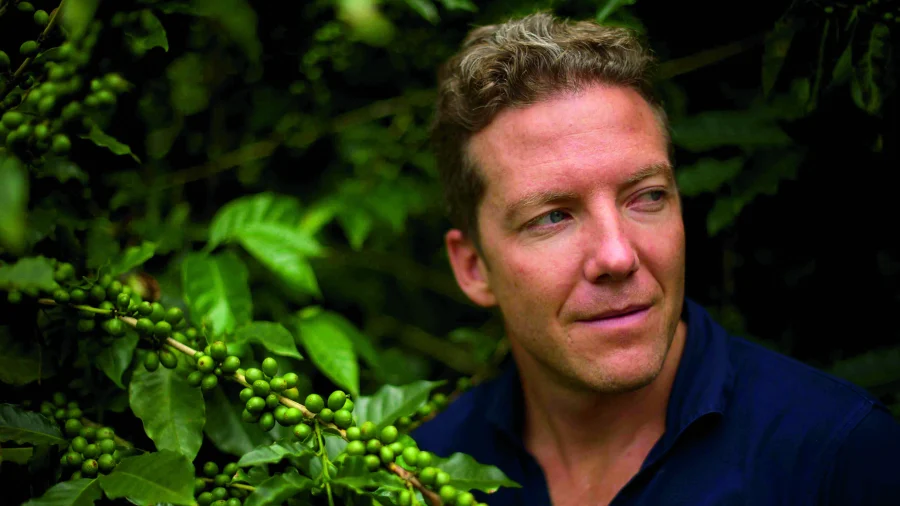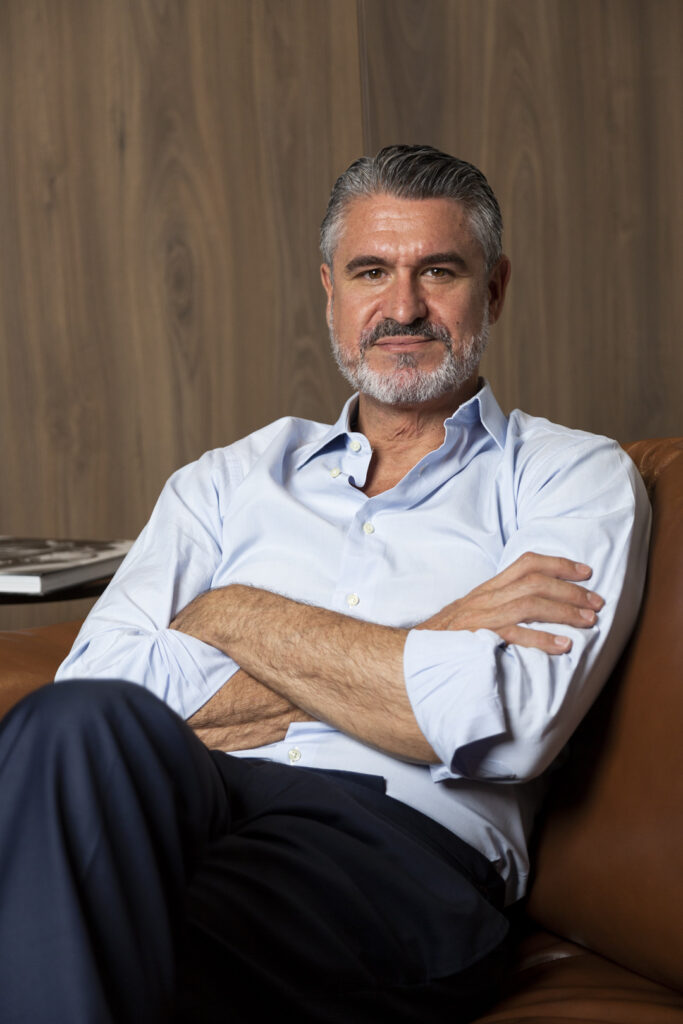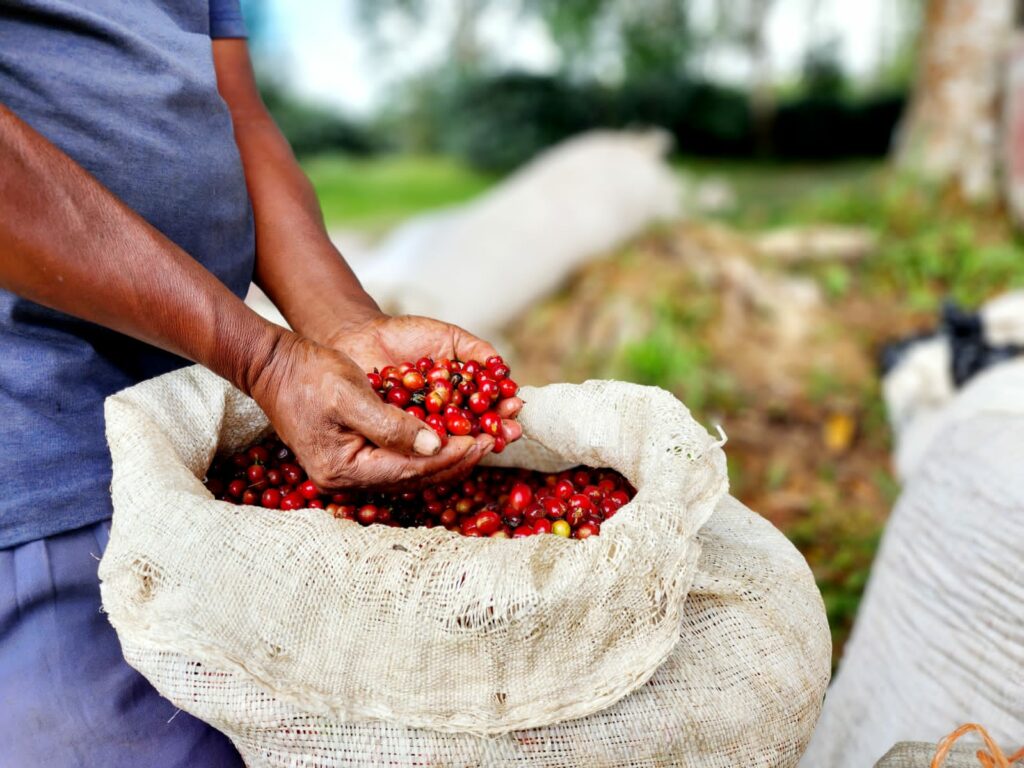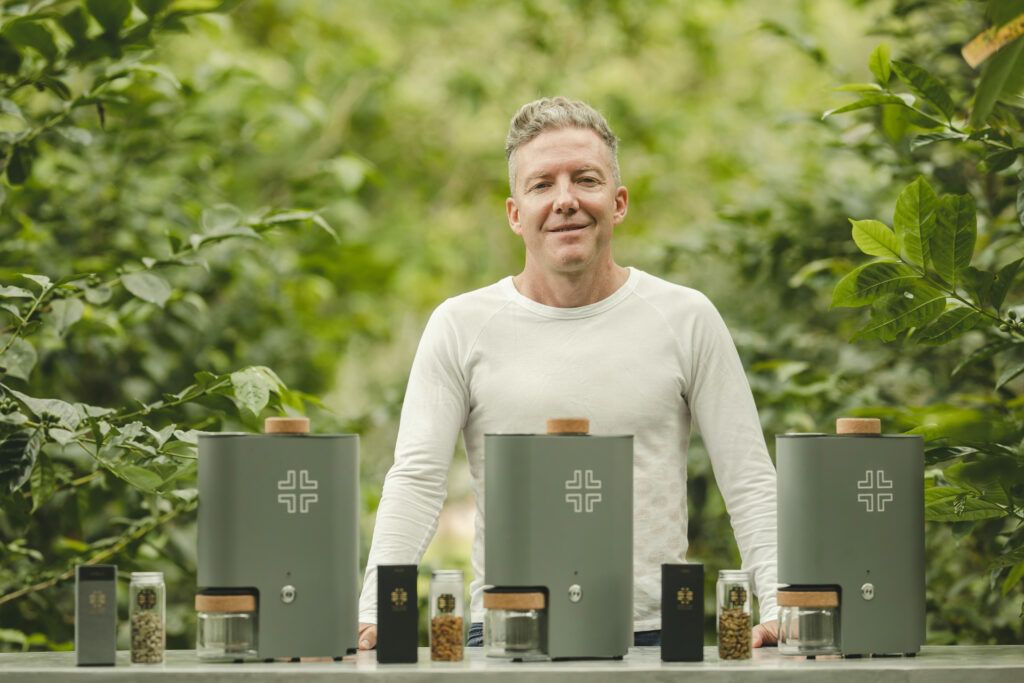Por: Clint Carter
Fuente: Men's Journal / ver fuente original
DESDE NUESTRO MIRADOR EN LO ALTO DE UNA COLINA en el norte de Panamá, se puede ver Costa Rica hacia el oeste, y el Volcán Barú, la montaña más alta de Panamá, hacia el este. Un dosel de selva tropical se extiende hasta el horizonte, y parece que estamos caminando por una naturaleza salvaje. La única pista de lo contrario es un grupo de recolectores de café con botas de goma, apiñados y recogiendo la cosecha del día. "No puedes conocer este lugar hasta que conozcas el bosque", dice el fundador de la finca, Joseph Brodsky, haciendo un gesto hacia la vista delante de nosotros. "De aquí es de donde viene el sabor".
Brodsky me está dando un recorrido por su plantación de café de 182 hectáreas, y la siguiente parada es el Río Colorado, que marca la frontera este de la propiedad. Llegar allí requiere descender más de 900 pies a través de una serie de curvas. Brodsky, de 44 años, lleva su peso, los 64 kilos, en sus dedos de los pies, saltando sobre la vegetación de rodillas con una agilidad que proviene de toda una vida jugando fútbol. Al llegar al río, anuncia que es temporada de ácaros, se quita la camisa y los pantalones, y salta al agua para enjuagarse los ácaros nocivos. Desnudo hasta sus calzoncillos, se propulsa hacia un equilibrio sobre su cabeza en una roca plana justo encima de los rápidos. Después de 90 segundos cabeza abajo, observando el agua girando a su alrededor, baja sus pies y se sienta.
"¡Qué manera increíble de ver el río!", dice él.
Si el mundo del café tiene un Elon Musk, es Brodsky. Su gran idea es transformar los granos de café de una materia prima básica, como el jugo de naranja, en un lujo saboreado, como el vino fino. Su fanfarronería sólo se iguala a su ambición. El nombre de su empresa, Ninety Plus, es una referencia a la escala de 100 puntos de la Specialty Coffee Association. Nadie ha recibido una calificación mejor que 97. Ninety Plus ha alcanzado esa marca tres veces y sólo pondrá a la venta granos que califiquen por encima de 90. Una libra de café de Ninety Plus se vende al por menor por un promedio de $48, pero en una subasta del año pasado, un lote se vendió al por mayor por un récord de $2,269 por libra a un tostador en Asia. En ese momento, los granos básicos se vendían por un dólar por libra.
“Joseph ha desarrollado un producto completamente único", dice el famoso tostador George Howell, quien ha recibido un premio a la trayectoria por parte de la SCA. "Con mi primer sorbo, había una nota floral que nunca había tenido antes. Ni siquiera tengo que beber el café para disfrutarlo. Solo podría oler los aromas durante horas".
No hace mucho tiempo, el café venía en presentaciones regular y descafeinada, y eso era todo. Luego Starbucks irrumpió en el negocio, creando elegantes cafeterías con espresso tostado oscuro y elaboradas bebidas con leche. Pronto, una larga lista de tostadores especializados siguieron el ejemplo, y los consumidores se acostumbraron a pagar $5 por un Venti Americano. Pero hasta el día de hoy, excepto en círculos muy especializados, rara vez se sabe más sobre los granos que de qué país provienen. La gran visión de Brodsky es dar vuelta esa idea, creando cafés de alta gama que se distingan, y que se pidan en la cafetería por el nombre de la finca en la que se cultivaron los granos, tal como el vino se distingue por el viñedo.
“Las grandes marcas de café que la gente conoce son tostadores, como Nescafé o Starbucks”, dice. “Pero nadie puede nombrar un productor de café. Podemos ser esa marca”.
Coffee has been a passion of Brodsky’s since he was a kid growing up in Madison, Wisconsin. He and his older brother—now the owner of JBC Coffee Roasters in Madison—would often roast beans in a popcorn popper for fun. Years later, when Brodsky was attending Evergreen State College, he read a book called Coffee Basics, which described a bean from Ethiopia with blueberry and lemon flavors. Intrigued, he sought out the coffee, tasted it, and suddenly knew what he wanted to do with his life. In 2000, at 26 years old, Brodsky left school to open Novo Coffee in Denver with the help of his dad and another brother. Their goal was to focus on roasting and selling those Ethiopian beans. But consistency was a problem. “I’d have to sort through 200 coffees to find maybe one that I liked,” says Brodsky.
After traveling to Ethiopia to judge a coffee competition in 2005, Brodsky decided to stay until he had a better grasp on why the beans were so variable. The move wound up being semi-permanent. Brodsky quickly discovered that farmers had no incentive to improve their products because everything was being sold for the same price, often mixed together.
“In wine, there’s a feedback loop between taste, research, and development,” he says. “Coffee didn’t have that. Most growers today still don’t know the taste of their beans.”
So Brodsky partnered with local farmers to develop beans and, for the next four years, bounced between the U.S. and Ethiopia tasting each harvest. When the coffee was good, he’d have the farmer duplicate the procedures that created it. One bean that always stood out was called “gesha,” an heirloom varietal that many farmers ignored due to its low yield. But gesha is delicious and intensely fruity, and Brodsky began growing more of it, eventually selling the beans under the name Ninety Plus.
As he was experimenting in Ethiopia, other farmers began planting gesha in Panama, and in 2009, Brodsky signed a $1.6 million loan on a cattle ranch there, just 15 miles from the border with Costa Rica. His first step was to plant thousands of castor plants and palo blanco trees, which produce no sellable crop but provide ample shade and nourish the soil. Then he sprinkled in the geshas, spacing them far apart so they wouldn’t have to compete for nutrients. It generally takes five years for coffee trees to mature, so to keep his cash-strapped farm afloat, Brodsky continued working with Ethiopian farmers while trying to woo investors.
Yes, You Will Want to Spend $80 on This Coffee Mug
“I had rejections from the biggest players in the industry,” he says. “They’d visit the farm, fall in love, but then be too scared to invest.”
Finally, in 2014, Ninety Plus Gesha Estates sold its first beans. That same year, during the World Brewers Cup, an annual event to determine who can create the best cup of joe, master brewer Stefanos Domatiotis won using Brodsky’s beans. It was the first in a series of four straight wins, an unheard-of distinction.
During my visit to the farm in December, Domatiotis, a tall Greek from Athens, was on hand to inspect the early harvest. When he caught me eyeing some samples, he offered up a cup by asking, “Washed or natural?”
“Natural,” I said.
Where washed processing relies on water to rinse the cherry away from the bean (technically the seed of the fruit), natural processing allows the cherry to dry up and ferment on the bean and pass along wild flavors. Traditionally, natural processing has been used only on cheap coffee or beans grown in areas where water is scarce. But Brodsky showed that by following strict rules and controlling the environment, he could use natural fermentation to enhance the flavor—just one of his many innovations. In one of the farm’s wilder experiments, Brodsky and a visiting barista submerged beans in a 50-degree river and turned them twice daily for 10 days. “It smelled like champagne,” says Brodsky. It was probably the world’s first cold-fermented coffee, and it went on to win the 2015 Japan Barista Championship.
After brewing, Domatiotis served me a coffee that tasted like a velvety rich version of Earl Grey tea sweetened with some kind of berry. It was easily the best cup I’ve ever had.
“Too carbonic,” Domatiotis said.
“Yep,” Brodsky agreed. “With a better roast we can improve this by 15 to 30 percent.”
Later, Brodsky and Domatiotis began sampling the first 35 coffees harvested this season. They rattled off flavors with the cadence of auctioneers: miso, banana and carob, black pepper, avocado oil, and dulce de leche. Their ability to isolate individual flavors felt as if they were identifying cuts of steak by the sound of the sizzle. One aroma was characterized as “red pepper, but it wants to be savory and fruity at once.”
I simply nodded, stole a couple of sips, and asked, “Is ‘fucking good’ a useful descriptor?”
ON THE HEELS OF NINETY PLUS, natural-processed coffees are becoming increasingly common, and some producers, such as Colombia’s La Palma & El Tucán and the Australia-based Project Origin, are also experimenting with fermentation.
“We live in a time when people are indulging in better-quality beverages,” says Thomas Perez, CEO of Brooklyn’s Extraction Lab, which sells Ninety Plus for $18 a cup. “And the more you learn about coffee—just like with wine or beer or whatever you like—the more it becomes about quality over quantity.”
Currently most Ninety Plus beans are sold in Asia, where a high-end tea trade has made people more receptive to shelling out for delicate flavors. Over the next few years, Brodsky plans to push hard into the U.S. and launch a new brand, Baru Gesha, for beans that are just a few points shy of the Ninety Plus name. That’ll keep the flagship product strong while providing a better entry price for curious drinkers. “We’re still infants,” Brodsky says. “When people compliment my coffee, I say, ‘Thank you, but next year will be better.’ We’re already seen as the best in the world, but we haven’t done shit yet.”



